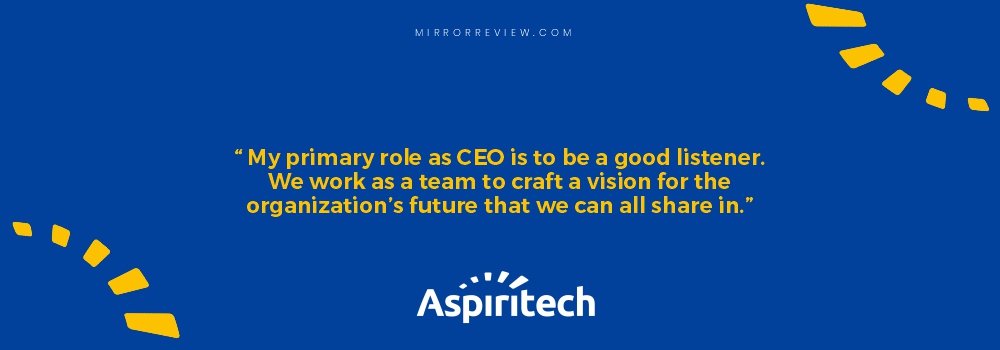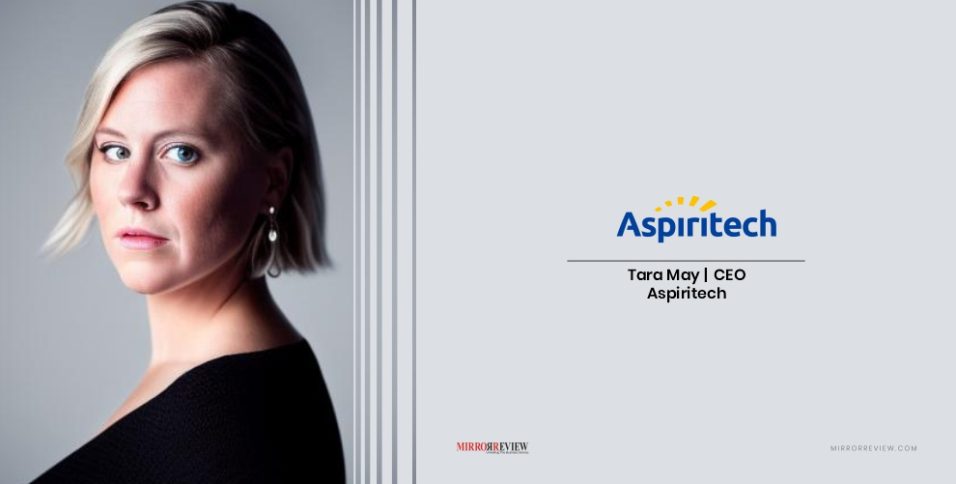Psychological safety fosters innovation.
If a person does not feel secure in a workplace, they will lack the willingness to propose new ideas, take a risk, or disrupt the status quo. Innovation is the doorway to success in tech, and strong, humble leadership is the key to opening that door. That’s the philosophy espoused by Tara May, the CEO of a tech services company. May knows a lot about lifting up team members and creating a collaborative, supportive, and effective work environment. Her company, Aspiritech, employs a workforce that is more than 90 percent autistic.
“Our culture at Aspiritech is built around valuing what each individual person brings to the workplace and how that makes us stronger together,” she said. “We strive to create an environment where everyone can thrive and reach their full potential.”
The organization’s mission is to provide meaningful careers for people on the autism spectrum who perform a variety of tech services. Aspiritech provides quality assurance, end-to-end user experience testing, data services, Salesforce cleanup, accessibility testing, and more. Their clients include BOSE, Goldman Sachs, Aon, Astellas, SourceAmerica, Abbott, Baker Tilly, and a host of others, ranging from two-person startups to Fortune 500 companies. In the last year, their new client revenue has risen by 40 percent.
The Aspiritech team’s expertise knows no bounds, and the team members’ work on projects for financial institutions, pharma companies, and tech startups. They work with client partners to offer a wide array of on-demand tech services, such as software QA, migrating data, filling in gaps in data, and cleaning up a Salesforce instance.
“Our team is passionate about user experience and excellence,” May said. “They want to identify and fix all the problems they see. It’s incredible the standards they hold themselves accountable to.”
May’s philosophy at Aspiritech is that a workplace should bring out the best in people. By creating a space that’s inclusive and welcoming, people will be able to do their best and be their best at work.
“People are humans 24 hours a day,” May said. “That doesn’t stop at work. When we care about people and understand what drives them, they can be their best selves.”
Deep-Seated Values
May’s belief in everyone’s inherent value and potential is deep-seated. She grew up in rural Michigan with loving parents who worked hard to give her and her sister more opportunities than they had. The May family started their lives in a small trailer and had to work long hours to stay on top of the bills and make a better life for their children. But May said she never even realized her family had less than others until she went off to college at Michigan State University.
“My parents filled my life with joy and love. They taught me that I should treat everyone equally, no matter where they came from or what they had,” she said. “I was taught to work hard and respect people – all people.”
She carried that philosophy with her in every aspect of her career. She quickly came to understand that treating her teams with kindness and respect brought about the best results.
“I strive to create a culture of kindness,” May said. “We need to constantly grow, evolve, and iterate. That means fostering a culture where people feel psychologically safe to fail so that we can try new things without fear.”
Journey of a Transformative Leader
May started her career in journalism with her first job as a crime reporter at the Roswell Daily Record in New Mexico. As the print newspaper industry encountered a critical juncture in shifting to digital, an editor invited her to help launch one of the Chicago Tribune’s web ventures, igniting her passion for using tech to solve problems.
“I realized there was a dearth of tech-savvy leadership, so it left a space for me to dig into an undeveloped area, make myself an expert, and provide value,” May said.
May went on to lead digital strategy and media products at Winsight, a B2B company serving the food service industry. Under her leadership, Winsight’s media division saw explosive growth in digital KPIs and 3X growth in revenue in less than five years.
For May, fast-moving tech provided an opportunity to be a transformative leader, both culturally and in product development. Although tech is sometimes viewed as an industry lacking in female leadership, May found comfort in very clear measures of success, which helped her overcome her imposter syndrome.
“The tech industry offers unique opportunities for women to shine because it’s so data-driven,” May said. “When a woman is successfully driving product innovation or revenue in tech, it’s right there in the KPIs, so it’s harder to ignore or promote based on bravado or ego.”
Early in her career, May faced her share of obstacles. She used to dye her hair black in an effort to be taken more seriously. Once, a mentor coached her to change the tone of her voice – she sounded too feminine. In general, people told her to succeed, she needed to look and act more like an executive. And executives were tall, white men.
“As I grew older and more confident, I learned to shed those limitations,” May said. “I remember one moment when I was scheduled to speak on the main stage at a conference. The day before, I stepped on a nail, putting it straight through the center of my foot! At first, I was a bit panicked about not being able to wear my usual heels. Finally, I grabbed my comfy flats and reminded myself, and hopefully, everyone in the audience, that sometimes leadership is short, blonde, and curvy. As it should be.”
May also encounter other stark realities. Many executives tend to hire and promote people who look like them or people they know. Some had jobs because they were relatives or friends of the boss. Executives often draw from their own affluent social circles to fill out the very tops of their organizations.
“I’ve stared at the proverbial glass ceiling and found ways to work around it to the best of my ability, but it’s still frustrating that it’s there at all,” May said. “I advocate for all organizations and leadership to look outside the box and hire a diverse group of people who will come with new ideas, new ways of thinking, and innovation that will drive you to the next level.”
Neurodiversity and Work
When the position at Aspiritech opened in April 2022, May saw it as the opportunity to lead an organization and implement her cultural vision – and she could do it at an organization whose mission she truly believed in.
“I’ve long held the belief that pairing someone’s talent and passion with a business need is a recipe for success,” May said. “It’s good for the business, the client, and the team member. That’s our entire model at Aspiritech. When a business approaches us with a need, we find the right team members to get the job done, creating a win for everyone.”
As the parent of an autistic son, Aspiritech’s work is very close to May’s heart. She and her husband embrace his autistic identity and believe it to be fundamental to who he is.
“The day he got his diagnosis, absolutely nothing changed,” May said. “He was the same joyful, kind, intelligent kid he was the day before. It was just now that we knew better how to offer him the support he needed.”
Aspiritech’s focus is on people on the autism spectrum, but May believes many of the company’s strategies can be applied broadly in all workplaces. It recently launched NeuroGrowth, an educational consultancy aimed at helping workplaces be friendlier to neurodivergent individuals.
The package includes live and on-demand training on how to address stress and anxiety in the workplace, improve communication for visual and auditory learners, improve performance management, promote workplace inclusion, and more.
One in five people is neurodivergent. Many are diagnosed and choose not to share it. Others were never diagnosed at all. Neurodiversity can absolutely be a competitive advantage if team members are given the right environment. Autistic team members, for example, can be 140% more productive than the average employee if paired with a job that aligns with their skills, according to the Harvard Business Review.
“You already have a neurodiverse team, whether you know it or not,” May said. “By thinking about all kinds of brains in the workplace, you’re making your company better for everyone.”
Building a Culture of Kindness and Innovation
In her first year at Aspiritech, May led through rapid change with a team that stereotypes might suggest would not grapple with it well. Instead, they’ve embraced it. When May and her team launched LinkedIn Learning, 100 team members took more than 7,000 courses in six months – the type of engagement most executives only dream of. She worked with leadership to revamp the PTO policy, introduce new program lines, relaunch the company website, revamp branding materials, add new customers, and boost client revenue.
“The team has risen to every single challenge,” she said. “They’ve shown me how to be a better leader and a better person.”
Aspiritech has inclusion groups for LGBTQ+ team members, women, parents, and caregivers, and an Autism Advocacy Group. They hold wellness sessions and town halls for employee feedback. They work on self-esteem and building each other up.
“We lift each other up,” she said. “We face challenges together. We don’t point fingers or apply blame. We look for solutions.”
A recent employee engagement survey demonstrates the results of the culture. The 2022 survey showed that more than 95 percent of the team is highly engaged and satisfied with their work; more than 91 percent believe they could bring a tough problem to leadership, and more than 90 percent believe Aspiritech is committed to creating an inclusive workplace.
All of those changes and initiatives began with a listening tour. May spent her first month at Aspiritech meeting with every single employee. Some chatted for an hour. Some for just a few minutes. Each had ideas, opinions, concerns, and questions. And what May is most proud of is that the team came together to work to create a vision of the company they wanted to become.
“My primary role as CEO is to be a good listener. I listen to things my colleagues are struggling with and help remove obstacles and solve problems. I listen to the market and our customers about how we can improve and evolve,” she said.
“We work as a team to craft a vision for the organization’s future that we can all share.”
Data Points
- 95% of the team is highly engaged and satisfied with their work (Source: Aspiritech 2022 Employee Engagement Survey).
- Autistic team members can be up to 140% more productive than average employees when matched with a job that fits their skills (Source: Harvard Business Review).
- Aspiritech achieved more than 40% growth in new business in 2022 under May’s leadership.
Quotes

Also Read: The 10 Influential Women in Tech, 2023





